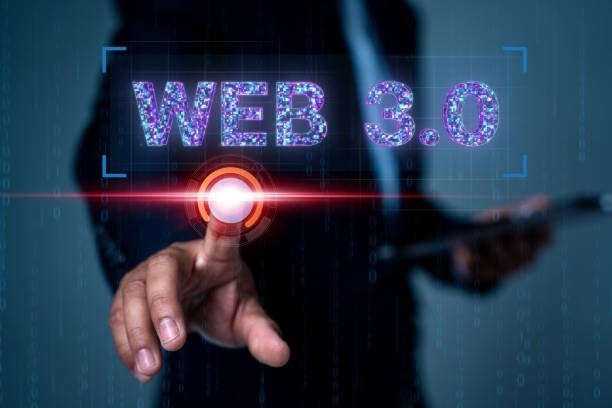Unlock Your Future 🚀 Explore Web 3.0 technology—the future of the internet 🌐 Understand and embrace its limitless potential! 💡
Web 3.0
Web 3.0, often referred to as the decentralized web, represents a transformative evolution of the internet that aims to enhance user autonomy, privacy, and transparency while breaking away from traditional centralized control. Unlike its predecessors—Web 1.0’s static pages and Web 2.0’s interactive content dominated by major platforms—web 3.0 integrates advanced technologies such as blockchain, artificial intelligence (AI), and decentralized networks to create a more user-centric environment.
This next generation of the web empowers individuals by enabling true data ownership and facilitating peer-to-peer interactions without intermediaries. With concepts like cryptocurrency, non-fungible tokens (NFTs), and decentralized applications (dApps) gaining traction, Web 3.0 seeks to redefine online experiences across various sectors—from finance to entertainment—by fostering trust through transparency and decentralization.
As we stand on the brink of this new digital frontier, exploring the principles underlying Web 3.0 reveals not only its technological innovations but also profound implications for how society interacts with information and commerce online in an increasingly interconnected world.
Relevance of Understanding Web 3.0
Grasping Web 3.0 is crucial as it represents the future of the decentralized internet, empowering users with greater data ownership and privacy while fostering innovative technologies like blockchain, AI, and smart contracts, transforming digital interactions and economies globally.
Web 3.0 refers to the next evolution of the internet, focusing on decentralized technologies and enhanced user experiences. It aims to empower individuals through greater data ownership, transparency, and interoperability among diverse platforms and applications.
Real-World Applications and Impact of Web 3.0
Web 3.0 enhances the browsing experience by prioritizing user privacy, enabling decentralized applications, and fostering data ownership. Its semantic web capabilities provide personalized content, making online interactions more intuitive, secure, and aligned with individual preferences.
The Role of Web 3.0 in Digital Marketing
Web 3.0 significantly transforms digital marketing by emphasizing decentralization, enhanced user privacy, and personalized experiences through blockchain technology. This evolution enables brands to engage more authentically with consumers, fostering trust and creating more efficient marketing strategies.
Influence of Web 3.0 on Blockchain Technology and Cryptocurrencies
Web 3.0 significantly enhances blockchain technology and cryptocurrencies by fostering decentralized applications, enhancing user privacy, and promoting trustless interactions. This evolution leads to greater data ownership for users and opens new avenues for financial innovation and collaboration.
The Impact of Web 3.0 on Data Privacy and Security
Web 3.0 significantly influences data privacy and security by decentralizing information control, empowering users with ownership, enhancing encryption methods, and promoting transparency in data transactions, ultimately fostering a safer digital environment for individuals and organizations alike.
Embracing Web 3.0
Numerous companies have effectively embraced Web 3.0 technologies, showcasing innovative solutions. These case studies highlight how businesses leverage decentralized networks, blockchain applications, and enhanced user interactions to drive growth, improve transparency, and foster community engagement in their operations.
Tips for Incorporating Web 3.0 Strategies in Your Business
Explore effective methods to integrate Web 3.0 strategies within your company by leveraging decentralized technologies, enhancing user engagement through personalization, embracing blockchain for transparency, and fostering community-driven initiatives to drive innovation and growth in today’s digital landscape.
The Future of Internet Technology with Web 3.0
Web 3.0 could revolutionize the internet by enhancing decentralized applications, improving user privacy, enabling seamless data ownership, fostering dynamic interactions through AI and blockchain technologies, and creating more personalized online experiences across diverse platforms and ecosystems.
Drawing the Line of Where Web 3.0 Could Potentially Lead the World of Technology
Defining the boundaries of Web 3.0 is crucial for understanding its transformative impact on technology. This evolution may revolutionize digital interactions, enhance privacy and security, shift data ownership, and reshape the dynamics of online communities.
Discussing the Potential Pros and Cons of a Fully Interactive and Intelligent Web 3.0
Exploring the benefits and drawbacks of a fully interactive, intelligent Web 3.0 involves examining increased user engagement and personalized experiences alongside concerns about data privacy, security risks, and potential socio-economic inequalities stemming from technology access disparities.
Web 3.0 is still in development and hasn’t fully materialized yet. While its foundational concepts such as decentralization, blockchain technology, and enhanced user control are emerging, a complete realization remains an ongoing process rather than the current reality.
A Web 3.0 browser is a specialized tool designed to interact with decentralized applications and blockchain networks, enabling users to manage digital assets while ensuring privacy, security, and enhanced data ownership in an interconnected online environment.
Web 3.0 presents potential benefits, including enhanced privacy, user control over data, and decentralized applications. However, it also raises concerns about accessibility and widespread adoption. Ultimately, its impact will depend on implementation and societal adaptation.
Web 3.0 began to emerge in the early 2010s, evolving from earlier internet versions. This phase introduces decentralized technologies, enhancing user autonomy and data ownership while promoting semantic understanding and intelligent applications on the web.



